Unit 3 Welcome to Sunshine Town Reading2知识点课件20张
文档属性
| 名称 | Unit 3 Welcome to Sunshine Town Reading2知识点课件20张 |  | |
| 格式 | zip | ||
| 文件大小 | 5.9MB | ||
| 资源类型 | 教案 | ||
| 版本资源 | 牛津译林版 | ||
| 科目 | 英语 | ||
| 更新时间 | 2022-03-16 16:09:41 | ||
图片预览

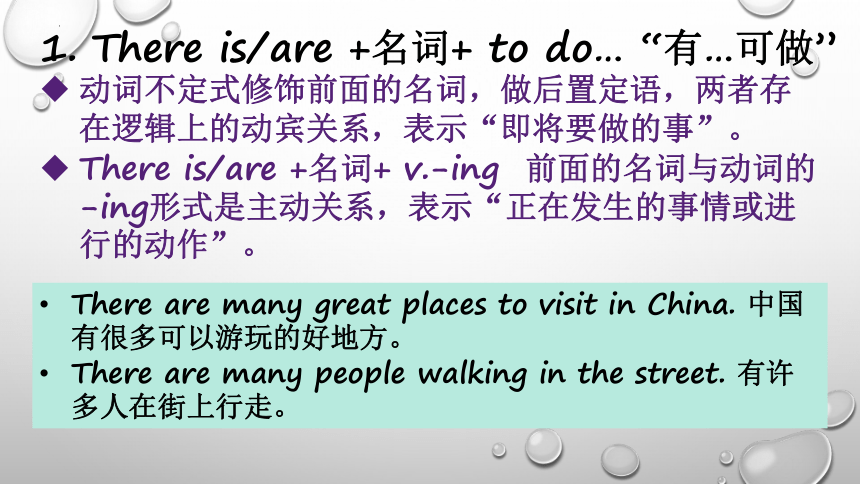
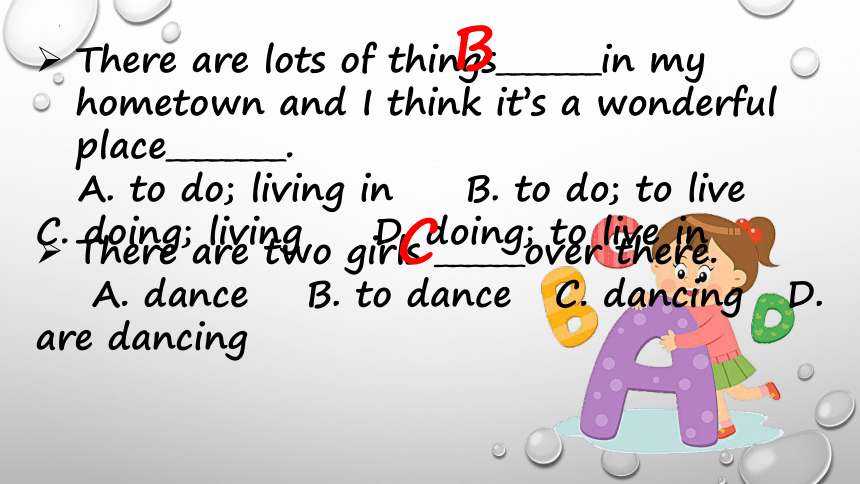
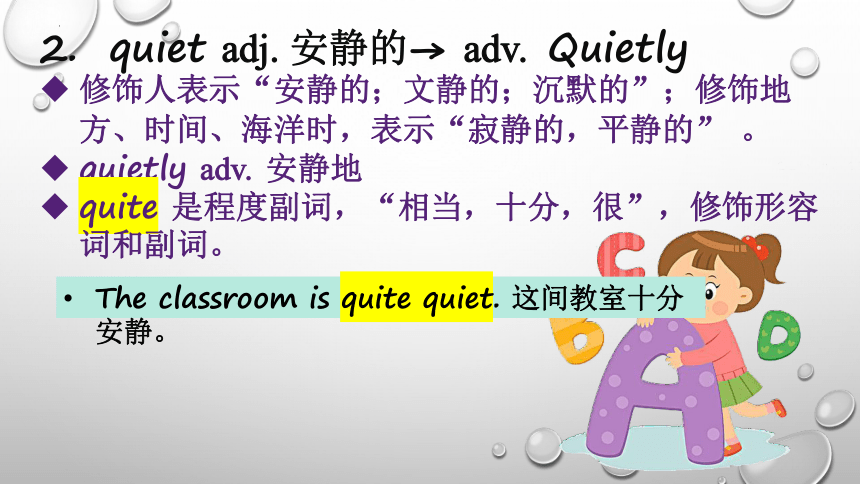
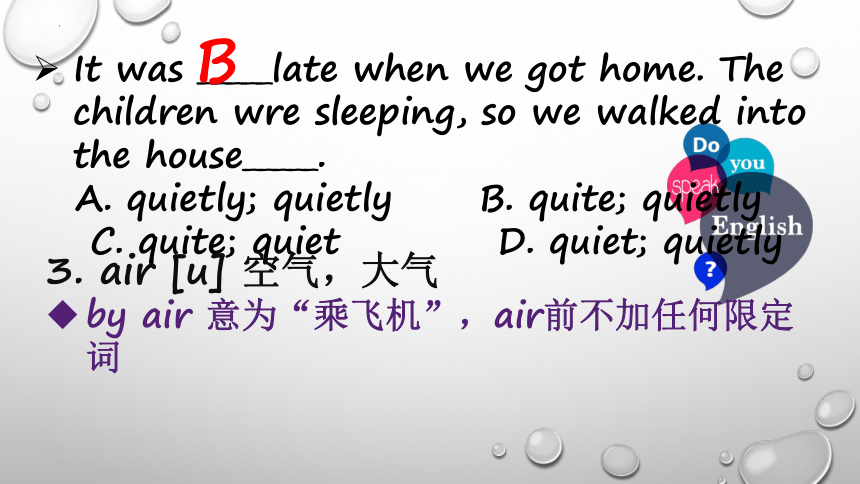


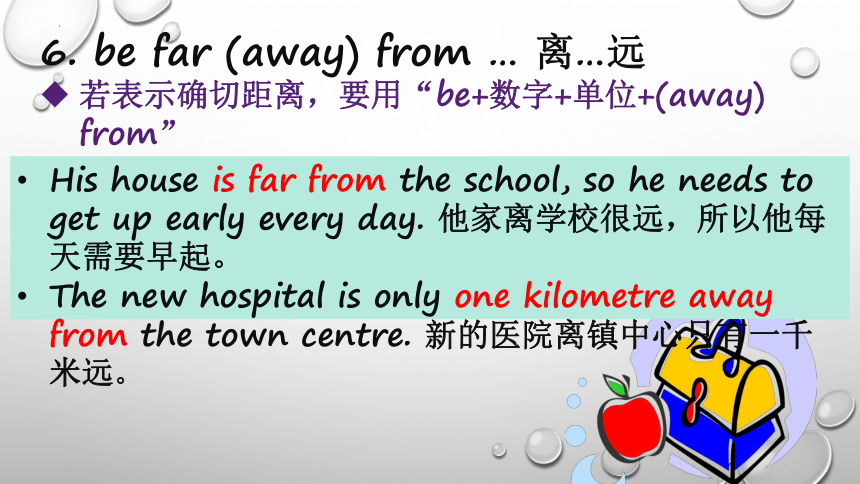
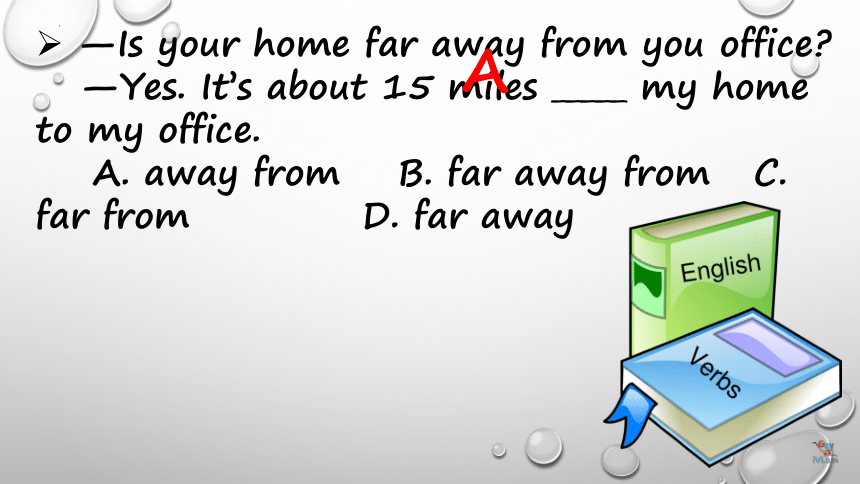
文档简介
(共20张PPT)
welcome to the unit&comic strips
Unit3 Welcome to Sunshine Town
Welome&Comic
There is/are +名词+ to do… “有…可做”
动词不定式修饰前面的名词,做后置定语,两者存在逻辑上的动宾关系,表示“即将要做的事”。
There is/are +名词+ v.-ing 前面的名词与动词的-ing形式是主动关系,表示“正在发生的事情或进行的动作”。
There are many great places to visit in China. 中国有很多可以游玩的好地方。
There are many people walking in the street. 有许多人在街上行走。
There are lots of things_______in my hometown and I think it’s a wonderful place________.
A. to do; living in B. to do; to live C. doing; living D. doing; to live in
B
There are two girls ______over there.
A. dance B. to dance C. dancing D. are dancing
C
2. quiet adj. 安静的→ adv. Quietly
修饰人表示“安静的;文静的;沉默的”;修饰地方、时间、海洋时,表示“寂静的,平静的” 。
quietly adv. 安静地
quite 是程度副词,“相当,十分,很”,修饰形容词和副词。
The classroom is quite quiet. 这间教室十分安静。
It was _____late when we got home. The children wre sleeping, so we walked into the house_____.
A. quietly; quietly B. quite; quietly
C. quite; quiet D. quiet; quietly
B
3. air [u] 空气,大气
by air 意为“乘飞机”,air前不加任何限定词
4. fresh “新鲜的”
多义词,可表示“新鲜的,新的,凉爽的,清新的”
Fresh milk is good for children. 鲜奶对孩子们有益。
Let’s go and get some fresh air. 让我们出去呼吸点新鲜空气吧。
—Your coffee is cold. Let me make you a _____cup.
—Thank you very much.
A. fast B. big C.fresh
C
5. local adj. 当地的,地方性的,本地的
作名词,为“本地人”
This is a local problem, not a nation-wide one. 这是地方性的问题,而非全国性的问题。
I asked one of the locals which way to go. 我问了一位本地人该走哪条路。
6. be far (away) from … 离…远
若表示确切距离,要用“be+数字+单位+(away) from”
His house is far from the school, so he needs to get up early every day. 他家离学校很远,所以他每天需要早起。
The new hospital is only one kilometre away from the town centre. 新的医院离镇中心只有一千米远。
—Is your home far away from you office
—Yes. It’s about 15 miles _____ my home to my office.
A. away from B. far away from C. far from D. far away
A
7. take 花费(时间等)
It takes sb 时间 to do sth 某人花费多长时间做某事,it为形式主语,真正的主语是后面的动词不定式。
对该句型中的时间提问用how long, how long does it take sb to do….
sb spend(s) 时间 (in) doing sth 某人花费多长时间做某事
It usually takes me half an hour to finish the homework.我通常花半个小时完成作业。
How long does it take to go to Beijing from Shanghai by train 她每天早上大约花一个小时读英语。
She spends about an hour reading English every morning.
—_____does it take_____to Beijing by train
— It takes about four hours.
A. How far; going B. How; to get
C. How long; to get
C
8. by underground 乘地铁
=on the/an underground,在句中做状语
做谓语时要用take an/the underground to….
Do you usually go to work by underground
= Do you usually take the/an underground to work 你通常乘地铁去上班吗?
—Is it far from your home to the workplace
—A little. It is about 20 minutes by_____underground. A. a B. an C. the
D. /
D
9. famous adj. 著名的,出名的
be famous for… 因为…而出名
be famous as … 作为…而出名
be famous to… 对…而言是出名的
New York is famous for its skyscrapers. 纽约因它的摩天大厦而出名。
Mo Yan is famous as a writer. 莫言作为一位作家而出名。
The Great Wall is famous to the people all over the world. 长城对于全世界人民来说都很出名。
My hometown, Kunming, is famous____fresh flowers. No matter when you visit it, they will catch your eye.
A. as B. for C. of B. by
B
10. if conj. 如果
主将从现:if引导条件状语从句的主从复合句中,如果主句是一般将来时,从句用一般现在时表示将要发生的动作。
Your parents will be happy if you win the game. 如果你赢了这场比赛,你的父母会很高兴。
We will go for a picnic if it______rain this Sunday.
A. doesn’t B. won’t C. isn’t D. didn’t
A
11. west n. 西方,西部→western adj. 西方的
east 东;东方→ eastern 东方的
north北;北方→northern 北方的
south 南;南方→ southern南方的
12. Why not do… 用于提出建议
= Why don’t you do..
= Shall we do..
=Let’s do…
13. miss vt. 错过;想念 (三单+es)
后接名词、代词或者动词-ing形式做宾语
Simon loves football. He never misses any football game. 西蒙喜欢足球。他从来没有错过任何一场足球比赛。
You don’t know how much I miss you. 你不知道我有多想念你。
If you want to learn more about Chinese art,__________(not miss) the opera shows there.
don’t miss
14. look forward to (doing) sth 期盼(做)某事
The worried mother is looking forward to_________(hear) from her daughter.
hearing
14. soon adv. 很快,不久;(常用于一般将来时)
how soon “多久,多快”, 对“in+一段时间提问”
Mr li is exvited because he will have a long holiday soon. 李先生很兴奋,因为他很快将有一个长假。
—How soon can you finish it 你多久能完成它?
—In a week. 一周后。
—_____will you finish doing your work
— In a week.
A. How often B. How soon C. How long D. How far
B
welcome to the unit&comic strips
Unit3 Welcome to Sunshine Town
Welome&Comic
There is/are +名词+ to do… “有…可做”
动词不定式修饰前面的名词,做后置定语,两者存在逻辑上的动宾关系,表示“即将要做的事”。
There is/are +名词+ v.-ing 前面的名词与动词的-ing形式是主动关系,表示“正在发生的事情或进行的动作”。
There are many great places to visit in China. 中国有很多可以游玩的好地方。
There are many people walking in the street. 有许多人在街上行走。
There are lots of things_______in my hometown and I think it’s a wonderful place________.
A. to do; living in B. to do; to live C. doing; living D. doing; to live in
B
There are two girls ______over there.
A. dance B. to dance C. dancing D. are dancing
C
2. quiet adj. 安静的→ adv. Quietly
修饰人表示“安静的;文静的;沉默的”;修饰地方、时间、海洋时,表示“寂静的,平静的” 。
quietly adv. 安静地
quite 是程度副词,“相当,十分,很”,修饰形容词和副词。
The classroom is quite quiet. 这间教室十分安静。
It was _____late when we got home. The children wre sleeping, so we walked into the house_____.
A. quietly; quietly B. quite; quietly
C. quite; quiet D. quiet; quietly
B
3. air [u] 空气,大气
by air 意为“乘飞机”,air前不加任何限定词
4. fresh “新鲜的”
多义词,可表示“新鲜的,新的,凉爽的,清新的”
Fresh milk is good for children. 鲜奶对孩子们有益。
Let’s go and get some fresh air. 让我们出去呼吸点新鲜空气吧。
—Your coffee is cold. Let me make you a _____cup.
—Thank you very much.
A. fast B. big C.fresh
C
5. local adj. 当地的,地方性的,本地的
作名词,为“本地人”
This is a local problem, not a nation-wide one. 这是地方性的问题,而非全国性的问题。
I asked one of the locals which way to go. 我问了一位本地人该走哪条路。
6. be far (away) from … 离…远
若表示确切距离,要用“be+数字+单位+(away) from”
His house is far from the school, so he needs to get up early every day. 他家离学校很远,所以他每天需要早起。
The new hospital is only one kilometre away from the town centre. 新的医院离镇中心只有一千米远。
—Is your home far away from you office
—Yes. It’s about 15 miles _____ my home to my office.
A. away from B. far away from C. far from D. far away
A
7. take 花费(时间等)
It takes sb 时间 to do sth 某人花费多长时间做某事,it为形式主语,真正的主语是后面的动词不定式。
对该句型中的时间提问用how long, how long does it take sb to do….
sb spend(s) 时间 (in) doing sth 某人花费多长时间做某事
It usually takes me half an hour to finish the homework.我通常花半个小时完成作业。
How long does it take to go to Beijing from Shanghai by train 她每天早上大约花一个小时读英语。
She spends about an hour reading English every morning.
—_____does it take_____to Beijing by train
— It takes about four hours.
A. How far; going B. How; to get
C. How long; to get
C
8. by underground 乘地铁
=on the/an underground,在句中做状语
做谓语时要用take an/the underground to….
Do you usually go to work by underground
= Do you usually take the/an underground to work 你通常乘地铁去上班吗?
—Is it far from your home to the workplace
—A little. It is about 20 minutes by_____underground. A. a B. an C. the
D. /
D
9. famous adj. 著名的,出名的
be famous for… 因为…而出名
be famous as … 作为…而出名
be famous to… 对…而言是出名的
New York is famous for its skyscrapers. 纽约因它的摩天大厦而出名。
Mo Yan is famous as a writer. 莫言作为一位作家而出名。
The Great Wall is famous to the people all over the world. 长城对于全世界人民来说都很出名。
My hometown, Kunming, is famous____fresh flowers. No matter when you visit it, they will catch your eye.
A. as B. for C. of B. by
B
10. if conj. 如果
主将从现:if引导条件状语从句的主从复合句中,如果主句是一般将来时,从句用一般现在时表示将要发生的动作。
Your parents will be happy if you win the game. 如果你赢了这场比赛,你的父母会很高兴。
We will go for a picnic if it______rain this Sunday.
A. doesn’t B. won’t C. isn’t D. didn’t
A
11. west n. 西方,西部→western adj. 西方的
east 东;东方→ eastern 东方的
north北;北方→northern 北方的
south 南;南方→ southern南方的
12. Why not do… 用于提出建议
= Why don’t you do..
= Shall we do..
=Let’s do…
13. miss vt. 错过;想念 (三单+es)
后接名词、代词或者动词-ing形式做宾语
Simon loves football. He never misses any football game. 西蒙喜欢足球。他从来没有错过任何一场足球比赛。
You don’t know how much I miss you. 你不知道我有多想念你。
If you want to learn more about Chinese art,__________(not miss) the opera shows there.
don’t miss
14. look forward to (doing) sth 期盼(做)某事
The worried mother is looking forward to_________(hear) from her daughter.
hearing
14. soon adv. 很快,不久;(常用于一般将来时)
how soon “多久,多快”, 对“in+一段时间提问”
Mr li is exvited because he will have a long holiday soon. 李先生很兴奋,因为他很快将有一个长假。
—How soon can you finish it 你多久能完成它?
—In a week. 一周后。
—_____will you finish doing your work
— In a week.
A. How often B. How soon C. How long D. How far
B
